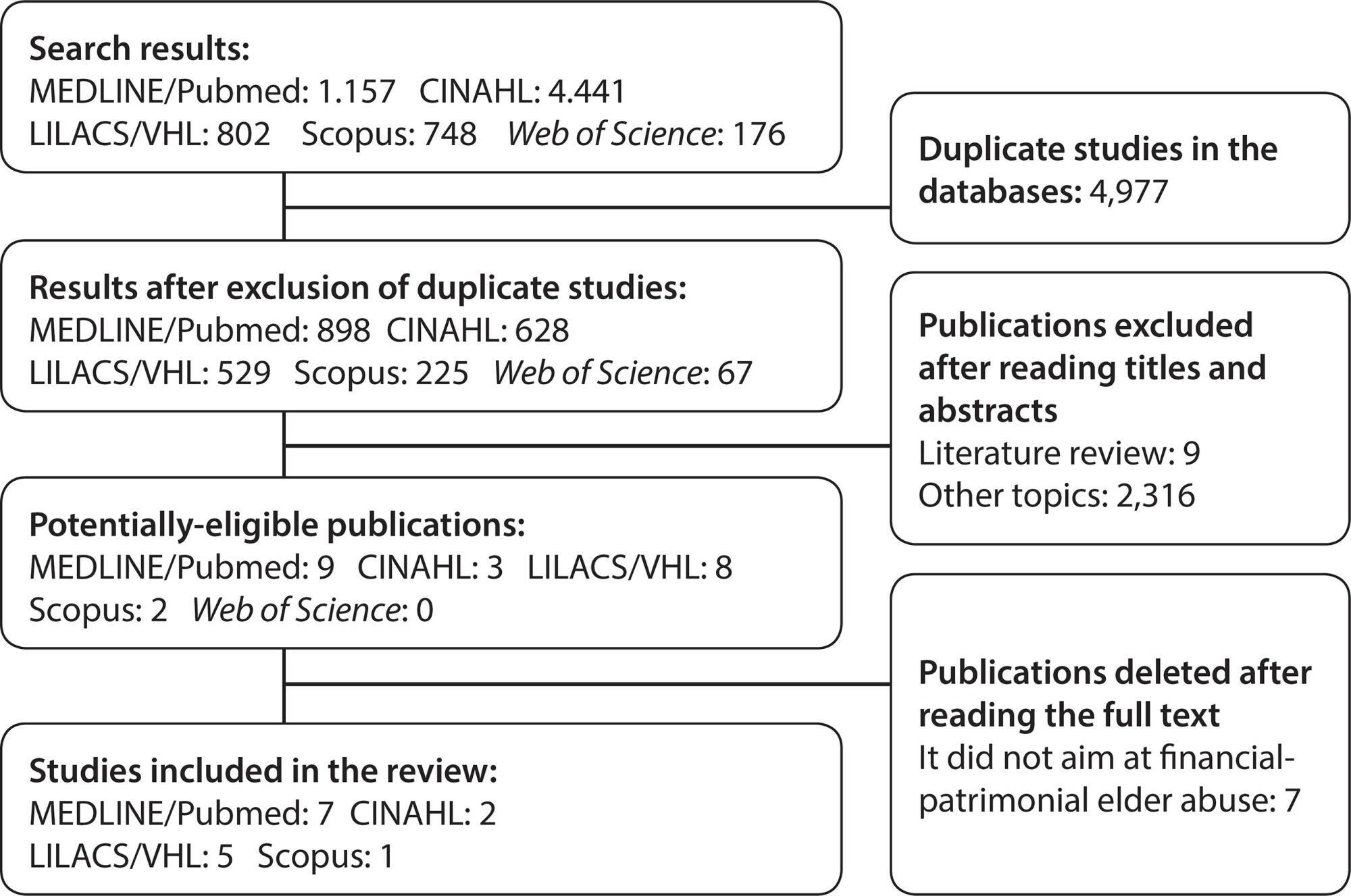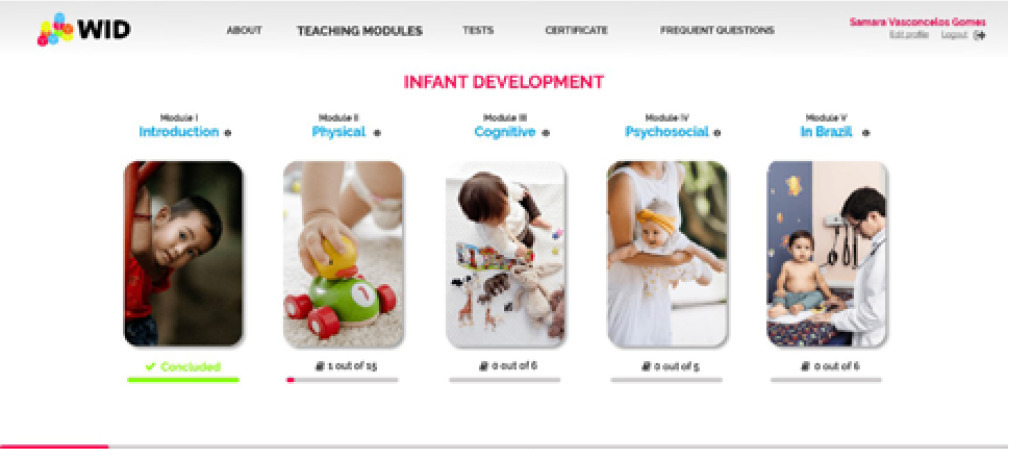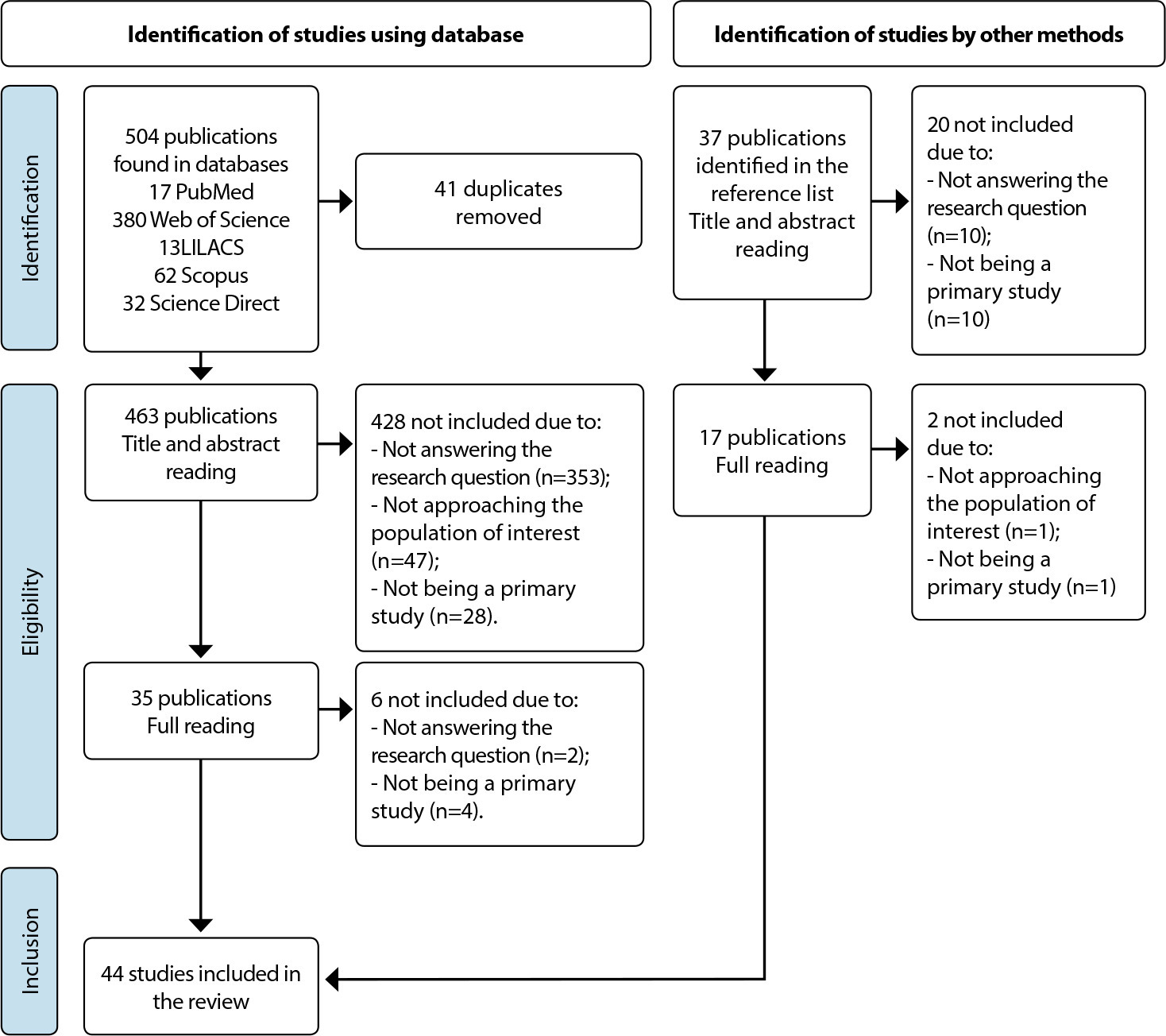-
RESEARCH01-01-2016
Influence of sociodemographic and clinical characteristics at the impact of valvular heart disease
Revista Brasileira de Enfermagem. 2016;69(1):40-46
Abstract
RESEARCHInfluence of sociodemographic and clinical characteristics at the impact of valvular heart disease
Revista Brasileira de Enfermagem. 2016;69(1):40-46
DOI 10.1590/0034-7167.2016690105i
Views0See moreABSTRACT
Objective:
to analyze the sociodemographic and clinical characteristics of patients with valvular heart disease and to verify the influence of these variables on the impact of valve disease in daily life.
Method:
the study involved 86 outpatients. Data collection was performed in two stages – face-to-face interview for sociodemographic and clinical characterization and through telephone contact for the application of the Instrument to Measure the Impact of Valvular Heart Disease on Patient’s Everyday Life (IDCV). Data were analyzed through descriptive statistics and multiple regression analysis.
Results:
it was noticed that the total score of IDCV and its domains were influenced by age, schooling, presence or absence of symptoms, use or not of diuretic.
Conclusion:
The impact of the disease was influenced by sociodemographic and clinical variables. The results provide subsidies for the design of nursing interventions aimed at reducing the impact of the disease on the patient’s daily life with valve disease.
-
RESEARCH01-01-2016
Health indicators of workers of the hospital area
Revista Brasileira de Enfermagem. 2016;69(1):30-39
Abstract
RESEARCHHealth indicators of workers of the hospital area
Revista Brasileira de Enfermagem. 2016;69(1):30-39
DOI 10.1590/0034-7167.2016690104i
Views0ABSTRACT
Objective:
to analyze the health indicators of workers of hospital area for exposure to workloads, wear processes and its consequences.
Method:
a retrospective, descriptive and exploratory study performed in a hospital in southern Brazil. The population consisted of 1,050 workers notifications of registered in the Monitoring System of Nursing Workers Health, in 2011.
Results:
80.8% of the records were female workers, with 34.2% aged between 31 to 40 years old, corresponding to 2478 working lost days. The results subsidized the implementation of nine indicators that showed the prevalence of respiratory and osteoarticular problems.
Conclusion:
the results allow the reflection and redirection of actions for workers’ health, as the processes of becoming ill are compounded by exposure to psychic burdens. These indicators, when monitored, can contribute to the transformation of the profile of morbidity of these workers.
Keywords:Epidemiological SurveillanceHealth Basics IndicatorsHospital Human ResourcesNursingOccupational HealthSee more -
RESEARCH01-01-2016
Evaluation of environmentally sustainable actions in the medication process
Revista Brasileira de Enfermagem. 2016;69(1):23-29
Abstract
RESEARCHEvaluation of environmentally sustainable actions in the medication process
Revista Brasileira de Enfermagem. 2016;69(1):23-29
DOI 10.1590/0034-7167.2016690103i
Views0See moreABSTRACT
Objective:
to analyze sustainable actions from an environmental point of view in the medication process, from the reception of the prescription of the pharmacy to waste discard by nursing.
Method:
study before and after performed through Lean Six Sigma methodology. The sample consisted of the amount and type of waste resulting from the pharmacy and nursing services of a medical-surgical clinical unit.
Results:
after the intervention was obtained at the pharmacy a reduction of 74.8% of chemical, infectious and sharps waste, an increase of 33.3% of common recyclable and 20% of common non-recyclable. In nursing, there was a reduction of 22.5% of chemical, infectious and sharps waste, an increase of 22.9% of common recyclable and an increase of 20% of common non-recyclable.
Conclusion:
the practice of sustainable actions in the hospital is possible, contributing to the optimization of resources and waste production with benefits to the institution, environment, and health.

-
RESEARCH01-01-2016
Nursing education: training evaluation by graduates, employers and teachers
Revista Brasileira de Enfermagem. 2016;69(1):16-22
Abstract
RESEARCHNursing education: training evaluation by graduates, employers and teachers
Revista Brasileira de Enfermagem. 2016;69(1):16-22
DOI 10.1590/0034-7167.2016690102i
Views0ABSTRACT
Objective:
to support the assessment and the necessary changes in the curriculum of an undergraduate degree in Nursing.
Methods:
it is a descriptive study developed in two stages as an action research. In the first stage, the speeches of 19 graduates and 15 employers were interviewed and analyzed; in the second stage, five teachers participated in the focus group. For processing the data, the content analysis was adopted.
Results:
based on the assessment of the actors, an action plan was created with suggestions regarding the curriculum flexibility, content resizing, continuing education, practice enhancement, active methodologies and autonomy of the student.
Conclusion:
the participation of actors participants of the training process and performance of professional nurses in the evaluation of a curriculum pointed aspects to realignment and provided concrete benefits to improving the quality of undergraduate course curriculum, scenario of this study.
Keywords:CurriculumGraduate Programs in NursingNursing EducationNursing StudentsResearch in Nursing EducationSee more -
EDITORIAL01-01-2016
O desafio do 67º Congresso Brasileiro de Enfermagem: para onde caminha a Enfermagem brasileira?
Revista Brasileira de Enfermagem. 2016;69(1):7-9
Abstract
EDITORIALO desafio do 67º Congresso Brasileiro de Enfermagem: para onde caminha a Enfermagem brasileira?
Revista Brasileira de Enfermagem. 2016;69(1):7-9
DOI 10.1590/0034-7167.2016690101i
Views0Reunindo cerca de 3.700 participantes entre congressistas, palestrantes, equipe de apoio, organizadores e expositores, o 67º Congresso Brasileiro de Enfermagem agraciou São Paulo com reflexões profundas e significativas, na tentativa de dar sua resposta à questão “Para onde caminha a enfermagem brasileira?”.Desde a apresentação da proposta de sediar o evento até sua realização, o que […]See more -
EDITORIAL01-01-2016
The challenge of the 67th Brazilian Conference of Nursing: In what direction is the Brazilian Nursing going?
Revista Brasileira de Enfermagem. 2016;69(1):7-9
Abstract
EDITORIALThe challenge of the 67th Brazilian Conference of Nursing: In what direction is the Brazilian Nursing going?
Revista Brasileira de Enfermagem. 2016;69(1):7-9
DOI 10.1590/0034-7167.2016690101i
Views0Bringing together about 3,700 participants among conference participants, speakers, support staff, organizers and exhibitors, the 67th Brazilian Conference of Nursing extraordinary presented São Paulo with deep and meaningful reflections in an attempt to answer the question “In what direction is the Brazilian Nursing going?”.From the submission of the proposal to host the event until its […]See more -
REVIEW06-01-2015
Anticipated directives and living will for terminal patients: an integrative review
Revista Brasileira de Enfermagem. 2015;68(3):524-534
Abstract
REVIEWAnticipated directives and living will for terminal patients: an integrative review
Revista Brasileira de Enfermagem. 2015;68(3):524-534
DOI 10.1590/0034-7167.2015680321i
Views0See moreABSTRACT
Objective:
characterizing the national and international scientifi c literature about the advanced directives of living will as applied to the terminally ill patient.
Method:
integrative review considering the articles published in Portal Capes, SciELO, LILACS, MEDLINE, Journal of Bioethics and Bioethikos, with the descriptors: Advanced directives, Wills regarding life and Advance Directives, Living Will and Terminally Ill, totaling 44 articles submitted to content analysis.
Results:
three categories emerged: Students and professionals facing the advance directives of living will: Perceptions, opinions and practices; Patient’s receptivity to the Advance Directives of Living Will; The family facing the advance directives of living will.
Conclusion:
the relevance of the topic became evident as a guarantee of respect for the dignity and autonomy of the patient, as well as to reduce ethical confl icts faced by families and health professionals facing care at the end of life.
-
RESEARCH06-01-2015
Perceptions of adolescent students about drugs
Revista Brasileira de Enfermagem. 2015;68(3):517-523
Abstract
RESEARCHPerceptions of adolescent students about drugs
Revista Brasileira de Enfermagem. 2015;68(3):517-523
DOI 10.1590/0034-7167.2015680320i
Views0See moreABSTRACT
Objective:
To analyze the perceptions of adolescent public school students about drugs.
Method:
Qualitative approach of focus groups with 16 adolescent students. The data collected were analyzed by means of content analysis, leading to the following categories: meaning of drugs; living with drug use; opinions, beliefs and attitudes toward drug use; and preventing drug abuse in adolescence.
Results:
The adolescent students know about some drugs, and associate their use with delinquent and criminal behavior. The students identifi ed factors that lead to drug abuse, such as easy access, use by family and friends, idleness, dropping out of school and the characteristic vulnerability of adolescence.
Conclusion:
the results point to the need for educational activities in the context of where the adolescents live, including school, community and family environments, to support and to minimize their vulnerability.
-
REVIEW12-05-2019
Financial-patrimonial elder abuse: an integrative review
Revista Brasileira de Enfermagem. 2019;72:328-336
Abstract
REVIEWFinancial-patrimonial elder abuse: an integrative review
Revista Brasileira de Enfermagem. 2019;72:328-336
DOI 10.1590/0034-7167-2018-0703
Views0See moreABSTRACT
Objective:
to analyze the available evidence in the nursing literature about financial-patrimonial elder abuse.
Method:
integrative review of articles indexed in the databases CINAHL, Scopus, Web of Science, LILACS and MEDLINE, from 2007 to 2017. The combination of controlled and uncontrolled descriptors was used in Portuguese, English and Spanish.
Results:
15 studies developed in seven countries were included. In the thematic analysis, three categories emerged: epidemiological data, risk factors and institutions providing services to the elderly. The occurrence of this type of violence concomitantly to the other subtypes was highlighted among the most frequent.
Final considerations:
the literature points to important epidemiological data, risk factors and characteristics of this type of violence, including within institutions providing services to the elderly, in different countries, essential aspects for structuring and rethinking public policies for protection and appreciation of the elderly.

-
ORIGINAL ARTICLE07-06-2020
Vulnerability in the health of young transgender women living with HIV/AIDS
Revista Brasileira de Enfermagem. 2020;73(5):e20190046
Abstract
ORIGINAL ARTICLEVulnerability in the health of young transgender women living with HIV/AIDS
Revista Brasileira de Enfermagem. 2020;73(5):e20190046
DOI 10.1590/0034-7167-2019-0046
Views0ABSTRACT
Objectives:
to analyze the health vulnerability of young female transgender living with HIV/AIDS.
Methods:
qualitative, descriptive, and exploratory study, based on the theoretical reference of Social Representation and concept of vulnerability; developed with six transgender women in a reference Hospital for HIV/AIDS. We analyzed the individual interviews, recorded, and transcribed in full, in the IRaMuTeQ software by Similitude Analysis.
Results:
the thematic categories are listed based on the Ayres reference: 1) Individual dimension of vulnerability to HIV/AIDS; 2) Social dimension of vulnerability to HIV/AIDS; 3) Programmatic dimension of the vulnerability.
Final Considerations:
the young female transsexual living with HIV/AIDS experience a context of vulnerability in health associated with a lack of knowledge and difficulties for the realization of self-care. The study evidenced the representations of social abjection and unpreparedness of the health team that compose the Primary Attention in Health in promoting qualified assistance for the execution of the effective and humanized care.
Keywords:Acquired Immunodeficiency SyndromeHealth VulnerabilityHIV InfectionsNursingTransgender PersonsSee more -
EDITORIAL12-13-2019
Women’s health during pregnancy, childbirth and puerperium: 25 years of recommendations from international organizations
Revista Brasileira de Enfermagem. 2019;72:1-2
Abstract
EDITORIALWomen’s health during pregnancy, childbirth and puerperium: 25 years of recommendations from international organizations
Revista Brasileira de Enfermagem. 2019;72:1-2
DOI 10.1590/0034-7167-2019-72suppl301
Views0Women’s health during pregnancy, childbirth and the puerperium has been a concern of international bodies since the 1994 United Nations International Conference on Population and Development in Cairo, Egypt. This conference had as theme Women’s Health and Safe Motherhood. The rationale for choosing the theme was that pregnancy and childbirth-related complications were among the leading […]See more -
ORIGINAL ARTICLE04-22-2020
(Dis)continuation of care of the pre-term newborn at the border
Revista Brasileira de Enfermagem. 2020;73(3):e20180827
Abstract
ORIGINAL ARTICLE(Dis)continuation of care of the pre-term newborn at the border
Revista Brasileira de Enfermagem. 2020;73(3):e20180827
DOI 10.1590/0034-7167-2018-0827
Views0See moreABSTRACT
Objectives:
to understand how continuation of care for the preterm newborn in the health care network at the border.
Methods:
the Grounded Theory was the methodological framework. Data were collected through 17 semi-structured interviews between July 2016 and March 2017.
Results:
“Describing the structure and functioning of the Child Nutrition Center” represents the context; “Experiencing and signifying premature birth” are the causal conditions; “Identifying conditions that intervene in the process of continuation of care for the preterm newborn” are the intervening conditions; “Ensuring continuation of care for the preterm newborn” are strategies; “Identifying (dis)continuation of care flows for the preterm newborn at the border” are the study’s consequences and phenomenon.
Final Considerations:
there is a need to plan referral and counter-referral flows of the preterm newborn and the commitment of public health managers to ensure continuation of care.
-
ORIGINAL ARTICLE05-09-2022
Wise Infant Development®: creation of a software for teaching in pediatric nursing education
Revista Brasileira de Enfermagem. 2022;75(5):e20210466
Abstract
ORIGINAL ARTICLEWise Infant Development®: creation of a software for teaching in pediatric nursing education
Revista Brasileira de Enfermagem. 2022;75(5):e20210466
DOI 10.1590/0034-7167-2021-0466
Views0See moreABSTRACT
Objectives:
to create a software application for nursing education on child development assessment.
Methods:
this is a methodological applied research developed in three stages: analysis, design, and development. Product quality characteristics from the ISO/IEC 25010 standards were adopted. The programming language used was JavaScript. The educational software was developed based on a constructivist cognitive theory.
Results:
it was possible to create the software from the following quality metrics: functional suitability, reliability, usability, performance efficiency, compatibility, security, maintainability, and portability. The technology addresses child development in physical, cognitive, and psychosocial domains and how this assessment should be carried out in Brazil. The software has pre and posttests, 5 learning modules, certificate issuance, support for doubts, and an administrative panel. Final Considerations: it is concluded that the software adds to the existing tools for child development monitoring, facilitating students’ knowledge acquisition in promoting child health.

-
EDITORIAL12-04-2023
Nursing and the Sustainable Development Goals (SDGs): An Essential Commitment
Revista Brasileira de Enfermagem. 2023;76(6):e760601
Abstract
EDITORIALNursing and the Sustainable Development Goals (SDGs): An Essential Commitment
Revista Brasileira de Enfermagem. 2023;76(6):e760601
DOI 10.1590/0034-7167.2023760601
Views0The Sustainable Development Goals (SDGs) are a global initiative launched by the United Nations (UN) in September 2015 as part of the 2030 Agenda for Sustainable Development, whose objectives summarize a universal call to action to end poverty, protect the environment and ensure that all people have access to opportunities and well-being, all in an […]See more -
REVIEW04-22-2022
Health needs of mothers of children with Congenital Zika Syndrome: an integrative review
Revista Brasileira de Enfermagem. 2022;75:e20210540
Abstract
REVIEWHealth needs of mothers of children with Congenital Zika Syndrome: an integrative review
Revista Brasileira de Enfermagem. 2022;75:e20210540
DOI 10.1590/0034-7167-2021-0540
Views0ABSTRACT
Objectives:
to evidence and analyze the health needs of mothers of children with Congenital Zika Syndrome.
Methods:
a total of 44 articles published between October/2015 and March/2021 on PubMed, LILACS, Scopus, Web of Science and Science Direct were included. The RTI bank and CASP score were applied to classify the methodological quality of the studies. Reflective content analysis and Cecílio and Matsumoto’s taxonomy were used for analysis. Visual map was used as a technique for presenting the results.
Results:
mothers need access to social protection, family-centered, multi-professional empathetic monitoring, cultivating bonds and affection by professionals, sharing of care between health network services, strengthening the social support network and fostering coexistence groups between them.
Final Considerations:
intersectoral initiatives must be implemented for better housing conditions, fighting stigma, holding parents accountable and resuming life project.
Keywords:CaregiversCongenital AbnormalitiesHealth Service Needs and DemandMaternal and Child HealthZika Virus InfectionSee more
-
REFLECTION12-21-2020
War against the COVID-19 pandemic: reflection in light of Florence Nightingale’s nursing theory
Revista Brasileira de Enfermagem. 2020;73:e20200371
Abstract
REFLECTIONWar against the COVID-19 pandemic: reflection in light of Florence Nightingale’s nursing theory
Revista Brasileira de Enfermagem. 2020;73:e20200371
DOI 10.1590/0034-7167-2020-0371
Views0See moreABSTRACT
Objective:
To reflect on the relationship and importance of the environmental theory regarding practices for promotion, prevention, and treatment of COVID-19.
Methods:
A theoretical-reflexive study about the COVID-19 pandemic in light of the environmental theory proposed by Florence Nightingale.
Results:
It is observed that the application of the theoretical foundations proposed by the environmental theory is related to the current practices used in the fight against the COVID-19 pandemic.
Final Considerations:
It is believed that the theoretical basis is fundamental for the critical-reflexive training of the nursing professional, for the consolidation of Nursing as a science; therefore, it could provide a foundation in nowadays battle against the pandemic.
Search
Search in:
Nuvem de Tags
Aged (144) Atenção Primária à Saúde (239) COVID-19 (104) Cuidados de Enfermagem (269) Educação em Enfermagem (151) Educação em Saúde (139) Enfermagem (930) Estudos de Validação (131) Health Education (144) Idoso (208) Mental Health (149) Nursing (987) Nursing Care (306) Patient Safety (151) Primary Health Care (284) Qualidade de Vida (104) Quality of Life (106) Saúde Mental (145) Segurança do Paciente (150) Validation Studies (108)



